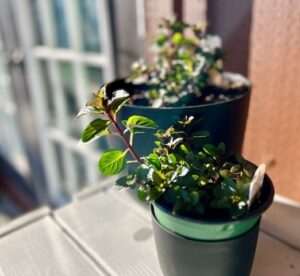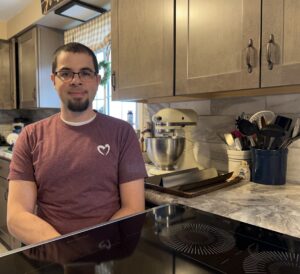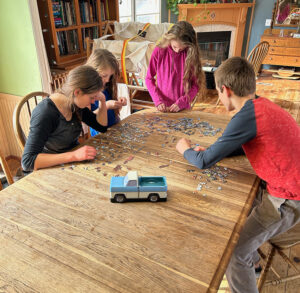by Lindsay Lehman
Editor’s Note: This article was written by Lindsay Lehman, daughter of Lehman’s President Galen Lehman and  granddaughter of Founder Jay Lehman. In light of our shared commitment to simple, self-sufficient living, let’s all take the time to consider this issue at Christmas and all year round.
granddaughter of Founder Jay Lehman. In light of our shared commitment to simple, self-sufficient living, let’s all take the time to consider this issue at Christmas and all year round.
It’s my first time here, at Michael’s house, and I scan the room, taking in the old, yet homey, décor surrounding me. Like most basements, his is cold, and I fold the felt blanket under my legs as I look around at my friends. A whole group of us are here, getting together one last time before heading off to college. I realize that we took over Michael’s entire basement. We are scattered all over the small room, some in chairs, some on the floor, and some beside me, sharing the scratchy, plaid couch.
Earlier we went to a local coffee shop and enjoyed sipping lattes and hot chocolate while we reminisced about high school. By the time we got back, we were all ready to settle down to a movie. But, we ended up arguing over which movie to watch for the next thirty minutes. To my chagrin, the group decided that we watch Groundhog Day—my least favorite romantic comedy of the 1990s. I was half-tempted to leave halfway through the movie, but I resisted and survived the next 101 minutes. Though, had I known what we would do next, I doubt I would have stuck around.
When the credits rolled it was only midnight. We couldn’t call it a night so early, so we had to do something else. We talked about what to do for some time, but, in the end, I am not sure how we came to our decision. And now, months later, it is still embarrassing to admit that we spent the next several hours sharing the experience of creeping people on Facebook.
When Michael first opened Facebook on his laptop, I did not believe that we would actually sink to the level that we did. However, minutes later, his Macbook was streaming its display to his big screen TV, allowing everyone to easily view each profile. I cannot believe that we are actually doing this, even as I hear my friends call out different profiles for Michael to navigate. We look through hundreds of pictures and profiles of friends, future roommates, and mere acquaintances. Something about this does not feel right to me, but instead of saying something, I’m sitting here thinking, Wow, we need to get a life.
Later that night, driving home, I continue to think about my time with my friends. I cannot believe that we wasted so much time. We could have been enjoying each other’s company, having a meaningful conversation, bringing about world peace—basically anything would have been better than jumping from profile to profile, judging people’s posts and pictures. Yet, something about Facebook kept us glued to the screen, preventing us from truly spending our time with each other. Although we were in the same room, we were entirely disconnected from each other except for the occasional comment about whatever we were looking at.
Now I see that this experience exemplifies many of the characteristics of technology and how it is often approached. Technology has much potential to be good. I would even go so far as to say that it has been a blessing in my life. For example, I have been able to keep contact with my brother in a way that would have been impossible before. We have lived hours apart for several years now, yet I can reach him easily. Whenever I see something that reminds me of him or something we did together, I can send him a quick text and receive an immediate response. Whenever I miss him I can give him a call just as easily. According to Powers, “Digital devices can and do make this happen. We use them to nurture relationships, to feed our emotional, social, and spiritual hungers, to think creatively and express ourselves†(105). This means that it is because of technology that my brother and I have been able to stay close, despite the miles between us. In this case, it was our cell phones, specifically, that have served as fuel for our relationship.
My experience at Michael’s house, however, proves that technology is not always beneficial. It can be useful, but it is often misused and ends up detracting from other things, instead of adding to them. My friends and I wasted our night away, and, as mentioned earlier, we were entirely disconnected from each other rather than relishing our last get-together before college. But, as I drove home that night, it was not that which bothered me; I was bothered by how we responded to what we saw on each profile. Every one of my friends there that night would refer to themselves as a Christian, yet we let loose a stream of judgmental comments along with each profile that loaded. Some were complimentary, but more often the comments we made were critical and unfounded.
Personally, I have seen this to be the norm, and when I am on Facebook, I tend to become critical and superficial. If there is no purpose behind logging on to Facebook, if it is only to waste time, this is almost inevitable. After surveying ten fellow college students, I found that the overwhelming majority goes on Facebook “to creep on people.†This involves looking through someone’s photos, friends, posts, comments made by their friends—everything. And, whether intentionally or not, creeping and judging go hand in hand. Rather than actually getting to know someone, people have easy access to a surface-level biography which allows them to scrutinize what that person says, what they are interested in, and how they look.
Worst of all, Facebook’s representation of someone isn’t even accurate. At the Worldview Forum that Malone University hosted recently, one of the speakers spoke specifically about how men agonize over their posts—what they say, how they say it, how their friends may read it. Meanwhile, women stress over which pictures their friends tag them in and which photos they should post on their profiles. This shows that when people have control over how others may view them, they cannot resist putting forth the best possible impression. Facebook gives people this opportunity, which means that profiles often represent someone’s ideal personification rather than reality. Nonetheless, this inaccurate portrayal is what people study and use to judge others. In other words, Facebook keeps people from genuinely getting to know others because they only view the edited version of one another.
This brief look at the uses of cell phones and Facebook can be applied to almost all types of technology, considering that there are benefits and downfalls to each type of technology. In this case, the benefit of cell phones is that they provide connectivity when it would be impossible otherwise, and Facebook’s downfall is that it can fuel superficiality.
Overall, it also shows that technology is not bad. Without technology my friends and I never could have gotten together in the first place—we needed phones to organize the last-minute event and cars to get to Michael’s house. Also, the meaningful part of our night, when we all shared memories over coffee, would have been impossible without transportation to get us downtown and of course, the espresso machines to make our lattes.
Later on, however, we took the blessing of technology for granted when we used it as a springboard to judge and criticize others. This goes hand in hand with Challies’ argument that “Technology, a good gift of God, is a gift that gets perverted and used to satisfy our selfish and evil desires†(24). This means that technology is good, an argument that is easy to forget in the controversy that surrounds it, however, it can easily fuel sinful behavior. Though it only leads to sin if we allow it too, thus it is up to us, the consumer, to use technology responsibly. But what does this look like?
If my friends and I would have taken a moment to think about what we were doing, I know that we would have behaved differently. This led me to believe that, in order to live with technology responsibly, people need to evaluate its role in their lives. They should ask how they use technology and how it may be affecting them. Challies’ affirmed this idea as well: “God calls us to use our minds, to use our Spirit-filled hearts, to distinguish between good and evil, between right and wrong, even in our use of technology.â€Â In other words, if Christians want to use technology responsibly, it is their responsibility to think about how they are using it. So, all in all, there is no clear answer to whether any type of technology is good or bad. It is impossible to classify anything in that way. What can be determined though, is whether it is used in a good or bad way. And, by those standards, my friends and I clearly need to reevaluate how we use technology.
*names have been changed


































